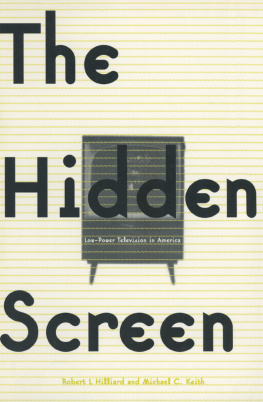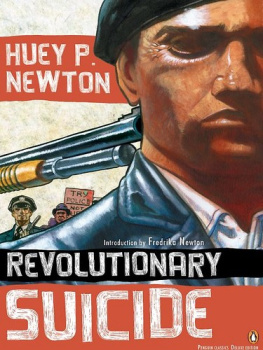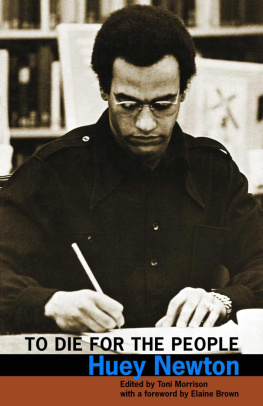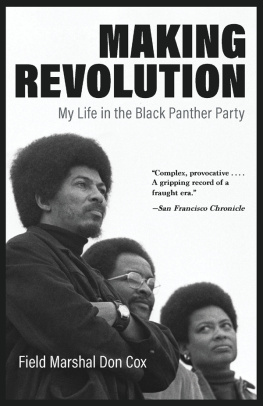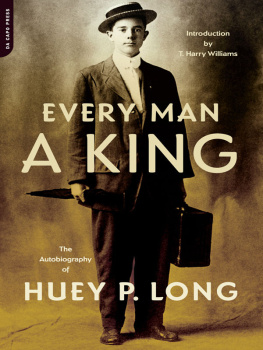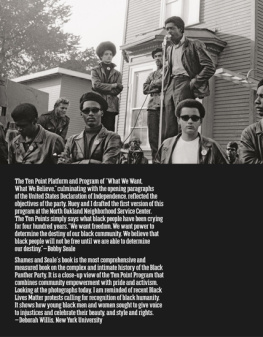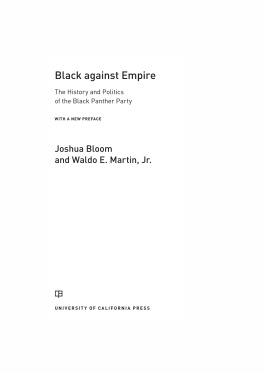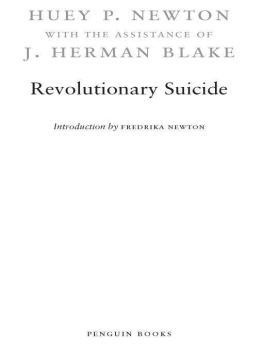David Hilliard - Huey: Spirit of the Panther
Here you can read online David Hilliard - Huey: Spirit of the Panther full text of the book (entire story) in english for free. Download pdf and epub, get meaning, cover and reviews about this ebook. year: 2006, publisher: Basic Books, genre: Detective and thriller. Description of the work, (preface) as well as reviews are available. Best literature library LitArk.com created for fans of good reading and offers a wide selection of genres:
Romance novel
Science fiction
Adventure
Detective
Science
History
Home and family
Prose
Art
Politics
Computer
Non-fiction
Religion
Business
Children
Humor
Choose a favorite category and find really read worthwhile books. Enjoy immersion in the world of imagination, feel the emotions of the characters or learn something new for yourself, make an fascinating discovery.

- Book:Huey: Spirit of the Panther
- Author:
- Publisher:Basic Books
- Genre:
- Year:2006
- Rating:3 / 5
- Favourites:Add to favourites
- Your mark:
- 60
- 1
- 2
- 3
- 4
- 5
Huey: Spirit of the Panther: summary, description and annotation
We offer to read an annotation, description, summary or preface (depends on what the author of the book "Huey: Spirit of the Panther" wrote himself). If you haven't found the necessary information about the book — write in the comments, we will try to find it.
Huey: Spirit of the Panther — read online for free the complete book (whole text) full work
Below is the text of the book, divided by pages. System saving the place of the last page read, allows you to conveniently read the book "Huey: Spirit of the Panther" online for free, without having to search again every time where you left off. Put a bookmark, and you can go to the page where you finished reading at any time.
Font size:
Interval:
Bookmark:
This book was made possible by the contributions of many people, including family, friends, and colleagues from Hueys life.
Foremost, I would like to acknowledge Fredrika Newton, whose love, strength, and trenchant wit inspired me to carry on my lifes work of restoring truth to the historical record by reclaiming the original vision of the Black Panther Party as it was set down by founder Huey P. Newton.
This book was also made possible by contributions from the Newton family, particularly Demetra Gayle, who brought new, firsthand accounts of Hueys family life to light. Without the encouragement, belief, and foresight of Keith and Kent Zimmerman to collaborate with Fredrika and me, this book would be nothing more than an idea. You guys made it happen!
I owe thanks to Professor Robert Trivers of Rutgers University and Professor Triloki N. Pandey of the University of California, Santa Cruz, for sharing their recollections of Hueys academic life. Their words are valuable testimonies to Hueys intellectual might.
Special thanks to George Robinson, Ericka Huggins, Andrea Jones-Dunham, John Oakes, Donald Freed, Charlie Winton, Bobby Seale, Jim Fitzgerald, Pat Richartz, Billy Che Brooks, and Stan McKinney.
Very special thanks to Don Weise for his work at the Huey P. Newton Foundation, including his contributions as coeditor of the Huey P. Newton Reader.
Former Oakland mayor Elihu Harris has my gratitude for introducing the Black Panther Party into the curriculum of the Peralta Colleges, where Huey and Bobby Seale met as students before going on to found the party in 1966.
O n October 18, 1967, Bobby Seale sat in jail. Five months earlier, the Sacramento state legislature had been visited by a group of gun-toting members of the Black Panther Party. Bobby was still locked up on gun charges after a compromise enabled the remaining members arrested in Sacramento to go free. Sacramento put the Black Panther Party on the map, just as Huey had planned. Immediately afterward, we were deluged with publicity and press from all over the world. Black Panther Party memberships came rolling in from all across the country. We went from being a small neighborhood Oakland organization to a nationwide phenomenon. Hueys plan had worked beautifully. Sacramento was the colossal event that sent shock waves throughout the country; black men and women in forty cities were prepared to defend their own people with their lives.
When Bobby Seale and Huey came together to form the Black Panther Party, they observed many political groups. Many seemed steeped in rhetoric, withdrawn from reality, with no practical programs for the people. The actions the BPP engaged in were purely strategic for political purposes designed to mobilize the community.
The situation was desperate, and some of our rhetoric became as inflamed as that used against us by politicians and media. The press painted us as wild, gun-toting animals. We had picked up the gun, now we could not put it down; the media froze us in this agonizing posture.
Bobby, the cofounder of the Black Panther Party, was incarcerated, and Huey wanted him out of the Santa Rita Jail. Huey didnt have a job. Today marked the end of his probation. I had a job and a car, a family, and very little money. The young Black Panther Party was experiencing one of its very first lows.
I would go over to Hueys house, and it might be two oclock in the afternoon. Hed still be lying in his bed, reading a magazine or a book. Thinking. Huey was always thinking, and I knew what was on his mind. I could see the wheels turning. How were we going to raise the bail to get Bobby out of Santa Rita? How were we going to top Sacramento in terms of another colossal event?
A windfall came our way in the form of a paid speaking engagement across the Bay at San Francisco State College. Like many colleges and universities, San Francisco State was already a hotbed of debate and radical politics. A year later the college would be the site of student riots, tear gas, strikes, and demonstrations under the tumultuous administration of S. I. Hayakawa, a conservative and feisty semantics professorturnedcampus president and later a Republican U.S. senator.
Huey and I jumped into my car and rode over to the campus, on the foggy side of San Francisco, to the student union, where Huey was scheduled to speak that day. After the speech, we looked at one another. Five hundred dollars. It was enough money, I figured. Now we could maybe parlay it into something bigger to help get Bobby out. At the very least, wed have ourselves a small reserve.
What do you think we should do? Huey asked me.
Before I had started my job at the longshoreman union hall, my best way of making money came from the street. I knew that weed was one of the easiest commodities to buy and sell quickly.
I know these guys whove got bricks, I suggested to Huey. Lets buy a couple, break them down, and sell them. Ill bet we can triple our money. I knew people who sold large quantities of weed. I figured we could break the stuff down and sell matchboxes full of it for five bucks apiece to raise money for Bobbys bail.
Gene McKinney had been my junior high school friend since the eighth grade. We grew up together in West Oakland, along with his four brothers and two sisters. A couple of those brothers were basketball players. Another brother, Bull McKinney, was built like a football player. They were all tough guys. Genes father held gambling parties at his house, and Genes mother would cook up a mountain of fried chicken and ribs and bake cakes. Gene was my big-brother, right-hand partner. The events of October 1967 brought Gene into the inner circle of the Black Panther Party.
Gene was a ladies man, a handsome guy. All the girls liked him. Plus, he was a good street fighter. He came out of the Codornices Village housing projects in Berkeley along with Bobby Seale.
Weve got to get Gene involved in this, I said to Huey.
Gene was an asset. Just about anytime during the week, you could go over to Genes house, especially during the weekends, and Genes daddy would be running his gambling parties, the biggest in West Oakland. My idea was that we would throw our own gambling party and raise enough money to bail Bobby out of Santa Rita.
Gene and my brother June agreed to help Huey and me out. Later, after we broke down the weed, we still had a few dollars left to buy food, hamburgers, and chicken for our party. June agreed to cook. We would pay the house. That meant the house could take a piece of all the gambling action. That way everybody wins. Players would pay us to come to the house and play. With the weed, food, and our gambling cut, wed all make money, Bobby would be out of Santa Rita, and we might even have enough left over for a three-hundred-dollar reserve. It was all set. Our gambling fund-raiser would be held at my house on Thirty-second Street and Magnolia. By two in the morning, we were doing all right. My place was packed. The house was jumping with winners and losers.
Then Huey had an idea. About a week earlier, he and I had been riding down Seventh Street. Seventh Street in Oakland was where all the street action was. We called it the Hoe Stroll. Huey recalled seeing a pretty young girl standing on the street with a pad of paper and a clipboard. She said she was conducting a sociology study for her college class. Huey liked what he saw.
Id like to be your student, Huey mused.
Here, the girl says, handing him the clipboard. Sign your name on this.
I had already forgotten about the girl, but apparently Huey hadnt. Now, here it was, two in the morning, and Huey turned to Gene.
I think I want to go down to Seventh Street and find my fine little sociology student.
Huey, I said, I really think that girl was a student. Besides, its two AM.
Next pageFont size:
Interval:
Bookmark:
Similar books «Huey: Spirit of the Panther»
Look at similar books to Huey: Spirit of the Panther. We have selected literature similar in name and meaning in the hope of providing readers with more options to find new, interesting, not yet read works.
Discussion, reviews of the book Huey: Spirit of the Panther and just readers' own opinions. Leave your comments, write what you think about the work, its meaning or the main characters. Specify what exactly you liked and what you didn't like, and why you think so.

